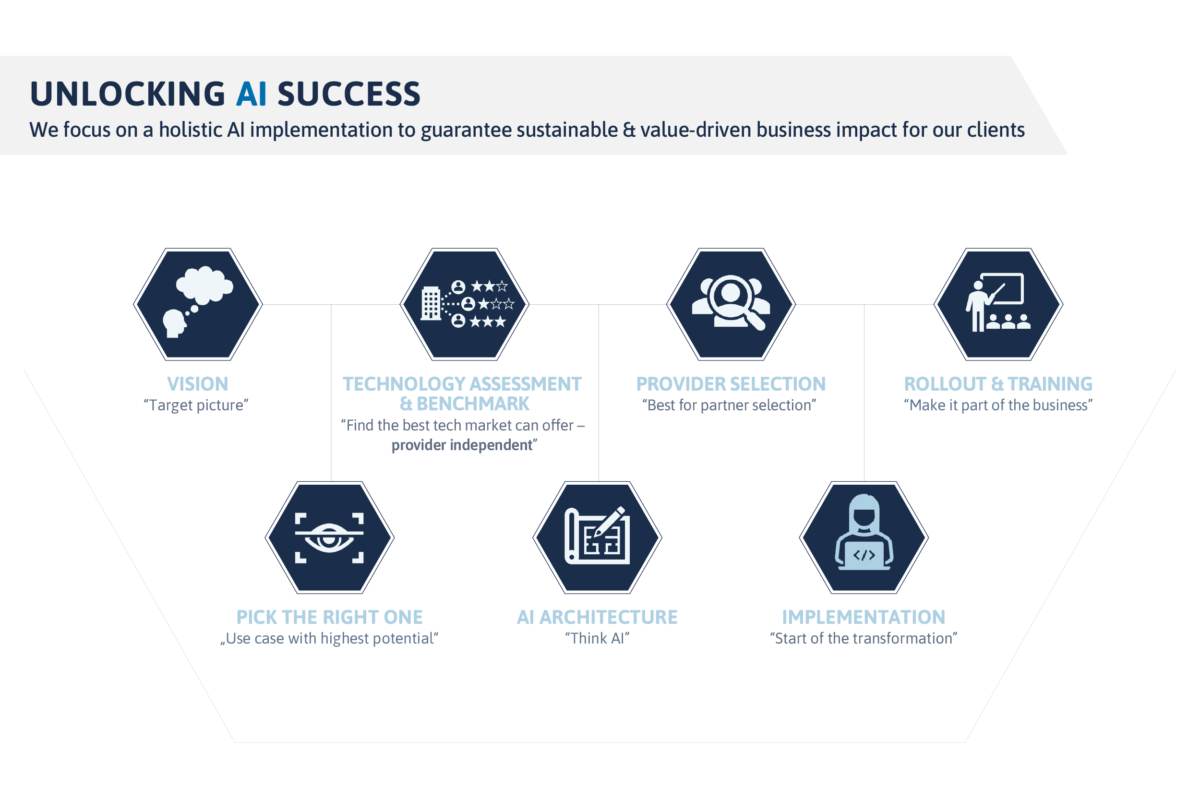From Theory to Practice: Successful AI Implementation in your Company
A successful implementation of an AI project is similar to other types of projects in its basic features – but the real challenge lies in the details. AI projects involve specific requirements and fine details that require focused attention and in-depth expertise during implementation.
AI-Project Roadmap with support from EFS Consulting
Start your AI journey with a clear and structured roadmap. We offer comprehensive implementation, from use case discovery and model selection to deployment and subsequent fine-tuning. All from a single source, ensuring a smooth and successful process.
AI Implementation Phases in Detail
1. Identifying and defining the use case
- Analysis of company processes and systems: Examination of existing processes, systems and problem areas in order to find specific starting points for AI.
- Recognizing AI potential and relevant use cases: Identification of areas in which AI can create real added value.
- Strategic embedding in a roadmap: Each use case should be part of an overarching strategy in which the projects are prioritized and coordinated in a meaningful way.
Important (!)
AI is not an end in itself and is not an universal cure. Only with a clear understanding of the technology and the necessary domain knowledge can meaningful and practicable use cases be derived.
2. Data collection and preparation: Optimal data preparation for AI models
- Data Engineering: Data is prepared by cleansing, transforming and converting it into a format suitable for AI models.
Important (!)
Ensuring data quality is crucial to the success of an AI application. Data must be complete, correct and representative, as the quality of the results depends directly on the available data. This step is often the most time-consuming, but also the most important for the success of the project – so it should be carried out with the utmost care.
3. Model development and training: Selecting the right AI model for your requirements
- Model selection: Selection of the AI model that best suits the task at hand, be it classic machine learning (ML) or a large language model (LLM).
- Model training or prompting: Different methods are available depending on the technology approach. With classic ML, the model usually has to be trained or obtained from suppliers (e.g. external providers or open source libraries). Generative AI, on the other hand, uses specialized prompts to achieve the desired results. It is now also possible not only to prompt Gen AI models, but also to train them with your own data (fine-tuning).
Important (!)
Technological independence and depth of knowledge are crucial, to make the most of the opportunities offered by AI. Given the rapid developments in AI, it is important to stay informed about the latest trends and tools. Model architecture also plays a key role: even small differences in architecture or model generation can have a significant impact on the costs and performance of the AI application.
4. Integration into existing systems: Successful integration of your AI solution
- Interface development: Creating efficient interfaces to seamlessly integrate the AI model into the existing IT infrastructure.
- Automation: Increasing efficiency by automating processes where possible.
Important (!)
Strict release processes and adherence to compliance and software release guidelines are essential for the success of a project. Many companies have strict requirements and security checks that must be taken into account during the course of a project. In addition, system complexity requires a deep understanding of the existing environment, especially in system landscapes with complex data structures that have grown over many years.
In AI compliance training courses, EFS Consulting imparts the necessary knowledge to enable stakeholders to use AI in accordance with the rules. In addition, questions about AI compliance, such as compliance assessments, data protection and ethics guidelines, etc. are answered by experts.
5. Evaluation and rollout: from test to successful introduction
- Testing phase: Carrying out comprehensive tests and fine-tuning to ensure the functionality and robustness of the model.
- Deployment: Putting the model into productive use and preparing the infrastructure for smooth operation.
Important (!)
To ensure that the deployment is successful in all aspects in the long term, all aspects from technical provision to cultural adaptation in the departments must be taken into account. EFS Consulting has extensive experience in the rollout management of IT tools and offers the tools required for this.
6. Fine-tuning, monitoring and maintenance: for the best possible performance of your AI solution
- Continuous monitoring: Monitoring the performance of the model during operation.
- Dynamic fine-tuning: Adjusting the model as required to adapt to changing conditions.
Important (!)
In order to keep the AI solution up to date and achieve maximum results, maximum performance and cost efficiency must be ensured. AI Solution Architects from EFS Consulting continuously adapt the models with state-of-the-art expertise.
What support does EFS Consulting provide for AI project implementation?
EFS Consulting provides comprehensive support through all phases of AI project implementation – from the initial idea to ongoing maintenance, always with customized solutions and industry-specific expertise. EFS Consulting supports you in selecting and implementing the optimal AI solution for your company.
- Skill level: We offer customized expertise for every project phase. From consultants with in-depth domain expertise, data engineers and AI solution architects to experienced software developers – EFS Consulting stays by your side with the right expertise at all time. This ensures that your project is optimally supported.
- Individual consulting: EFS AI experts analyze requirements in detail and develop tailored solutions to optimally support your business goals.
- Technological implementation: Experienced consultants provide support throughout the entire process, while data scientists and developers implement AI projects on a technical level.
- Education, training and support: Experts enable employees to use AI technologies successfully and provide support for a smooth introduction within the company.




